“The Hand that Touched Prince Henry’s”
A letter from Mary Lawton (“Mrs. Walton”) to Annie Fellows Johnston.
The cutest most interesting thing about this letter (and there are many of such) is the outline of Mrs. Lawton’s own hand on the last page…
| cover page | 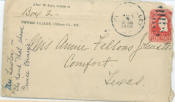 |
Mrs. Lawton, “The Hand That Touched Prince Henry’s” |
| page 1 | 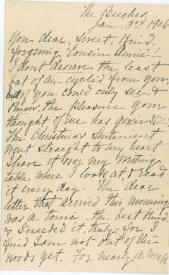 |
The Beeches. You dear, sweet, kind, forgiving “Cousin Annie”!— I don’t deserve the least bat of an eyelid from you, but if you could only see, and know, the pleasure your thought of me has given The Christmas Sentiment went straight to my heart. I have it over my writing table where I look at, I read it every day — the dear letter that arrived this morning was a tonic — the best kind. & I needed it truly — for I find I am not out of the woods yet. For nearly a week |
|
page 2 |
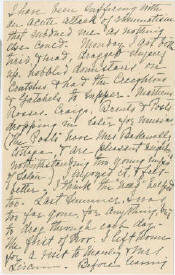 |
I have been suffering with an acute attack of rheumatism that subdued me as nothing else could. Monday I got both tired and mad, dragged myself up, hobbled downstairs on crutches and had the Creighton’s & Gatchels to supper. Matthews, Rosses, Craigs, Brents and Posts dropping in later for music. (The Posts have Mrs Bakewells cottage, & are pleasant neighbors notwithstanding two young imps of Satan) I enjoyed it, & felt better. I think the “~~” helped too. Last summer, I was too far gone, for anything, but to drag through each day. The first of Nov. I left home for a visit to Manley & Mrs Liscum(?). Before leaving |
| page 3 | 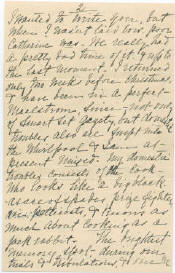 |
I wanted to write you, but when I wasn’t laid low, poorCatherine was — we really had a pretty bad time of it — & up to the last moment. — I returned only two weeks before Christmas, & have been in a perfect maelstrom since -not- only of smart set gayety, but domestic troubles also are swept into the whirlpool & I am at present wiped. My domestic troubles consists of the cook – who looks like a big black aceofspades prizefighter in petticoats, & knows as much about cooking as a jack rabbit. The brightest memory spot – during our trials & tribulations, & one I |
| page 4 | 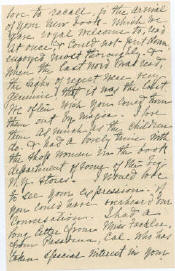 |
love to recall, is the arrival of your new book-Which we gave royal welcome to, read at once, & could not – put down, enjoyed most thoroughly. & when the last word was read, the sighs of regrets were very genuine, that it was the last. We often wish you could turn them out by magic. I love them as much as the children do. & had a lovely time with the shop women in the book department of the big N.Y. stores. I would love to see your expression- if you could have overheard our conversation. I had a long letter from Miss Fackler, from Pasadena, Cal – who has taken special interest in your |
| page 5 | 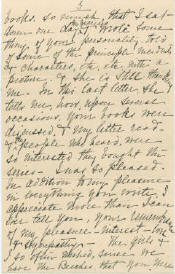 |
books. So much that I sat down one day two years ago & wrote something of your personality. told of some of the principle incidents & characters, etc, etc with a picture. & she is still thanking me. In this last letter, she tells me, how, upon several occasions, your books were discussed, & my letter read – & the people who heard, were so interested they bought the series – I was so pleased. In addition to my pleasure in everything you write I appreciate more than I can ever tell you, your remembrance of my pleasure – interest – love & sympathy — The girls & I so often wished, since we have the Beeches, that you were |
| page 6 | 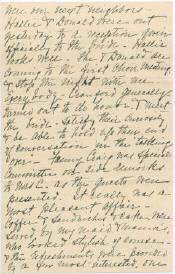 |
were our next neighbors – Hallie and Donald were out yesterday to a reception given officially to the bride – Hallie looks well. She & Donald are coming to the first choir meeting, and stay the night with me. Everybody – Cranford generally – turned out to do honors. & meet the bride – satisfy their curiosity & be able to hold up their end of conversation in the “talking over” –Fanny Craig was special Committee on side remarks to Mrs C. as the guests were presented. It really was a most pleasant affair – Coffee & sandwiches and cake were served by my maid ~~~, who looked stylish of course – & the refreshments were provided by a few most interested, one |
| page 7 | 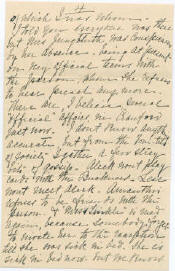 |
of which I was whom. I told you everyone was there butMrs. Jungbluth was conspicuous by her absence. Being at present on very official terms with the parson, whom she refuses to hear preach anymore. There are I believe, several “official” affairs, in Cranford just now. I don’t know anything accurate, but from the tom-tit of society, I gather a few stray bits of gossip – Aleck wont play cards with theBuckners – Lese won’t meet Aleck – Amanthis refuses to be friends with the new parson, & “Miss Tinkle” is mad again, because somebody forgot to invite her to the reception till she was sick in bed. She is sick in bed now. But we know |
| page 8 | 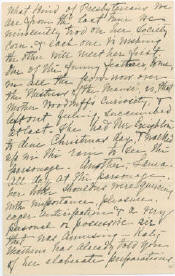 |
what kind of Presbyterians we are from the last time we innocently trod on her society corn. & each one is wishing the other will meet her first. One of the(?) funny(?) features(?) to me, in all the pow-wow over the “Mistress of the Manse”, is, that Mother Woodruff’s curiosity, & leftout feeling, succombed at least – She had Mrs Creighton to dine Christmas day, & walked up in the room to see the Parsonage – another – Laura. All day at the parsonage, her little shoulders were quivering with importance, pleasure, eager anticipation & a very personal or possessive air that was amusing – Katy Mathews has already told you of her elaborate preparations |
| page 9 | 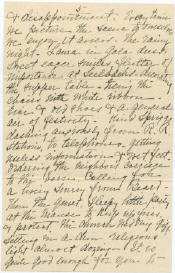 |
what kind of Presbyterians we are from the last time we innocently trod on her society corn. & each one is wishing the other will meet her first. One of the(?) funny(?) features(?) to me, in all the pow-wow over the “Mistress of the Manse”, is, that Mother Woodruff’s curiosity, & leftout feeling, succombed at least – She had Mrs Creighton to dine Christmas day, & walked up in the room to see the Parsonage – another – Laura. All day at the parsonage, her little shoulders were quivering with importance, pleasure, eager anticipation & a very personal or possessive air that was amusing – Katy Mathews has already told you of her elaborate preparations |
| page 10 | 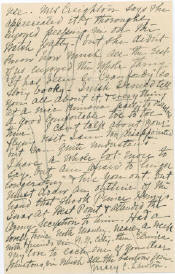 |
use. Mrs Creighton says she appreciated & thoroughly enjoyed peeping in on this match party. But she didn’t know how much all the rest pf us enjoyed the whole thing. It had been so “Cranfordy” so story booky — I wish I could tell you all about it and everything at a nice kimona party to ourselves a good comfortable toe to toe time. I can’t talk about your flying visit. I am too disappointed but can quite understand. I have a whole lot more to say, but am afraid to “linger linger longer Lucy” & tire you out, but must draw an outline of my hand that shook Prince Henry’s. I was at West Point & attended the army reception to him. Had a lovely time with Manley. Nearly a week with friends in N. Y. City, then Elmira. My love to each one of you dear Johnstons in which all the Lawtons join. Mary C Lawton |
*with many thanks to Toni Langlais and Ann Sharp in deciphering some of the more perplexing words in this letter
Note:
Cranford is a book written in 1853 by English author Elizabeth Gaskell. References to the book are made in The Little Colonel’s Christmas Vacation, published 1905, Chapter 13, Humdrum Days (as well as other places in the Little Colonel books).
“That reminds me of the game I spoke of, “said Miss Allison. “I invented it when I was about your age. I had just read ‘Cranford,’ and the story of life in that simple little village seemed so charming to me that I wished with all my heart I could step into the book and be one of the characters, and meet all the people that lived between its covers. Then I heard some one say that there were more interesting happenings and queer characters in Lloydsboro Valley than in Cranford. So I began to look around for them. I pretended that I was the heroine of a book called ‘Lloydsboro Valley,’ and all that summer I looked upon the people I met as characters in the same story….
….”This is not malicious gossip,” explained Mrs. Walton, in an amused undertone, smiling with Lloyd and Katherine at a remark which unintentionally reached their ears. “But in a little community like this, where little happens, and our interests are bound so closely together, the smallest details of our neighbours’ affairs necessarily entertain us. It is interesting to know that Mr. Rawles and his great-aunt are not on speaking terms, and it is positively exciting to hear that Mr. Wolf and Mrs. Cayne quarrelled over the leaflets used in Sunday school, and that she told him to his face that he was a hypocrite and no better than an infidel. It doesn’t make us love these good people any the less to know that they are human like ourselves, and have their tempers and their spites and feuds. We know their good side, too. Wait till calamity or sickness touches some one of us, and see how kind and sympathetic and tender they all are; every one of them.”
“You’ll hear more gossip here in one afternoon than at all the Cranford tea-tables put together,” said Katherine Marks. “But it is a mild sort, like the kind going on behind us.”
Interestingly, Mrs. Lawton refers to Pewee Valley as Cranford in this letter to Annie Fellows Johnston. It appeared to be kind of a pet name for Pewee (Lloydsboro) Valley, especially when she was regaling AFJ with the local “Cranfordy” type gossip. (See also a letter from Annie Fellows Johnston to Mrs. Lawton in 1908)
The town of Cranford certainly had some parallels to Pewee Valley at the time the Little Colonel books were written, since it was mainly a summer community of women and children whose husbands worked in town. This is how the first chapter begins:
“In the first place, Cranford is in possession of the Amazons; all the holders of houses above a certain rent are women. If a married couple come to settle in the town, somehow the gentleman disappears; he is either fairly frightened to death by being the only man in the Cranford evening parties, or he is accounted for by being with his regiment, his ship, or closely engaged in business all the week in the great neighbouring commercial town of Drumble, distant only twenty miles on a railroad. In short, whatever does become of the gentlemen, they are not at Cranford. What could they do if they were there? The surgeon has his round of thirty miles, and sleeps at Cranford; but every man cannot be a surgeon. For keeping the trim gardens full of choice flowers without a weed to speck them; for frightening away little boys who look wistfully at the said flowers through the railings; for rushing out at the geese that occasionally venture in to the gardens if the gates are left open; for deciding all questions of literature and politics without troubling themselves with unnecessary reasons or arguments; for obtaining clear and correct knowledge of everybody’s affairs in the parish; for keeping their neat maid-servants in admirable order; for kindness (somewhat dictatorial) to the poor, and real tender good offices to each other whenever they are in distress, the ladies of Cranford are quite sufficient. “A man,” as one of them observed to me once, “is so in the way in the house!” Although the ladies of Cranford know all each other’s proceedings, they are exceedingly indifferent to each other’s opinions. Indeed, as each has her own individuality, not to say eccentricity, pretty strongly developed, nothing is so easy as verbal retaliation; but, somehow, good-will reigns among them to a considerable degree. “
The entire book is online here: http://www.lang.nagoya-u.ac.jp/~matsuoka/EG-Cranford.html
Notes on specific pages:
Page 2
Creightons: The Rev. Cyrus Murray Creighton was pastor of Pewee Valley Presbyterian Church 1900-1907
Gatchels: Frances Edwin and Alice Craig Gatchel from Woodside — Alice was the niece of Mamie Lawton
Matthews: Kate Matthews and whichever of her siblings were living in Clovercroft at the time
Rosses — of the Ross Place
Craigs of Edgewood — Annie, Fanny, Harry (the special needs brother), Aleck Craig also referred to later in the letter
Brents — we’re not sure where they lived. Laura Woodruff Brent is pictured at the tree planting at the Presbyterian Church Her husband was Sprigg Brent and her father was H. M. Woodruff, owner of Pewee’s first general store; “Henry Martyn Woodruff (1838-1912) and his wife, Sallie Elam (February 23, 1838-February 27, 1910), are buried in Pewee Valley Cemetery, with their daughter Laura Woodruff Brent (1868-1907), wife of Sprigg Brent.”
Page 6
Hallie Burge and Donald Jacobs, the cousin of Mary G. Johnston by her father’s first marriage to Hallie Eaves. Hallie is Annie Fellows Johnston’s niece by her marriage. Pictured on the post office page.
Page 7
Mrs. Jungbluth is Amanthis Bullitt Smith Jungbluth, daughter of Captain Thomas Floyd Smith of Beechmore and sister to Thomas Floyd Smith, III of Louisville Paper Company who once gave John Johnston a job. Divorced from husband Karl Jungbluth, master of Waldeck, for infidelity.
Aleck is Aleck Craig, Mamie Lawton’s, Fanny Craig’s and Louise Culbertson’s brother; son of Annie Craig of Edgewood. Aleck eventually committed suicide.
Page 8
Mother Woodruff is Sally Elam Woodruff, wife of H. M. Woodruff and mother of Laura Woodruff Brent
We originally thought this passage described the marriage of the Jacobs, but maybe it was Laura’s wedding to Sprigg Brent (see above). Right now, we do not have the wedding dates for both couples.